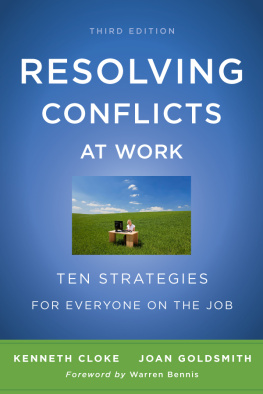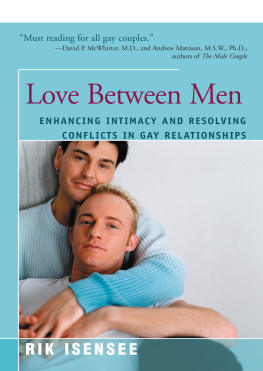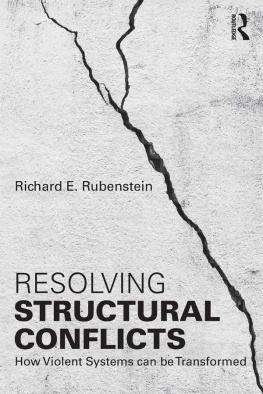COLUMBIA UNIVERSITY PRESS
Publishers Since 1893
New York Chichester, West Sussex
cup.columbia.edu
Copyright 2011 Columbia University Press
All rights reserved
E-ISBN 978-0-231-52528-2
Chapter 7, Diving In: A Handbook for Improving Race Relations on College Campuses Through the Process of Sustained Dialogue, by Teddy Nemeroff and David Tukey, is reproduced here by permission of the International Institute for Sustained Dialogue, Washington, D.C.
Library of Congress Cataloging-in-Publication Data
Resolving community conflicts and problems : public deliberation and sustained dialogue / edited by Roger A. Lohmann and Jon Van Til.
p. cm.
Includes bibliographical references and index.
ISBN 978-0-231-15168-9 (cloth : alk. paper)ISBN 978-0-231-52528-2 (e-book)
1. Conflict management. 2. Forums (Discussion and debate) 3. Intergroup relations. 4. Interpersonal communication. 5. Civil society. I. Lohmann, Roger A., 1942
II. Van Til, Jon.
HM1126.R46 2011
303.69dc22
2011005378
A Columbia University Press E-book.
CUP would be pleased to hear about your reading experience with this e-book at .
References to Internet Web sites (URLs) were accurate at the time of writing. Neither the author nor Columbia University Press is responsible for URLs that may have expired or changed since the manuscript was prepared.
AT LEAST SINCE THE war on poverty in the 1960s, with its famous strategy of maximum feasible participation of the poor, community organizers and social administrators in social work and colleagues in related disciplines have been concerned with questions of the place of citizen involvement in postindustrial democracy. The dawn of the Obama administration in January, 2009 had every appearance of a major departure from the public practices of recent decades in a number of different respects. Obamas 2008 campaign had appeared to suggest the possible beginning of a dramatic and entirely new approach to national government in the United States, with greater involvement from individual citizens and the general public in the business of government. Burdened in the short run by economic and international concerns and the polarities that the health care debate exposed, participatory politics has taken something of a backseat, and advanced forms of e-government still appear a ways off. But there is little doubt that there was greater emphasis on social networking and grassroots involvement in the Obama presidential campaign than at any time in the recent past. It also appears that the new administration is seeking to take fuller advantage of approaches to citizen participation and involvement that have developed as a community-level field of practice and have been discussed by small groups of community practitioners and political theorists for the past four decades.
By necessity, such activities have largely been conducted outside of mainstream public talk about public affairs for at least two reasons: Most important, within the media-generated public sphere, public talk has been increasingly held captive by the banal, barren, clich-ridden pronouncements of political factions largely bereft of ideas and, it appears at times, thought itself. Meanwhile, within the academy, assorted older models of representative democracy have largely held sway, with few notable exceptions, and the role of citizen has been seen as limited largely to casting periodic votes for elected officials, who are still viewed as the main actors in public life. Theoretically, the debate between representative and participatory forms of democracy is a legitimate and ongoing one in political philosophy, with a rich literature by contributors such as John Rawls, Jrgen Habermas, Michael Sandel, Benjamin Barber, Charles Taylor, Robert Nozick, and many others. While much of this discussion has been highly theoretical and abstruse, it has also served to legitimize a climate for practical experimentation and involvement in many communities.
Over against a national climate of deliberately cultivated divisiveness, many independent, community-level efforts have sought to promote serious citizen-to-citizen conversations across racial, gender, ethnic, religious, and other political frontiers. International efforts have included those of CIVICUS, one of whose board members is a contributor to this volume. These diverse efforts have produced a bewildering variety of models and approaches, as well as some efforts at coalition building among the advocates and convenors of public talk, such as members of the National Coalition for Deliberation and Dialogue. Much of this practical effort has involved more advocacy than critical reflection within the academy or in the community. A body of critical reflection on the multitude of practice models, to stand alongside the growing body of theoretical reflection, is long overdue. Two models with wide applicability to social work and community practicepublic deliberation and sustained dialogueare the central focus of this volume.
Within a social work context, public deliberation and sustained dialogue can be juxtaposed against all forms of therapy and counseling as different but allied forms of strategic talk. This obtains in more than a shared sense of presumed wellness, for the point appears to hold for approaches based on the strengths perspective as well. The adjectives in the titles of the two approaches are where the main difference is to be found: Public generally refers to issues of public or general interest as opposed to the private, intimate, personal, and confidential interests of therapy and counseling. Likewise, sustained refers to ongoing as opposed to short-term, one-time or quick-fix conversations, whether private or public. Deliberation and dialogue may be differentiated from therapy and counseling further in terms of the assumed equality of discussion leaders and participants as opposed to the implicit inequalitiesof knowledge, skill, and valuesimplied by professional models of therapist and client. Deliberation among fellow citizens over social problems and issues can be clearly and carefully differentiated from conversations between therapist and client on this basis. Such assumptions have long set community organizers, social administrators, and social policy analysts apart from clinical- and direct- practice perspectives in social work. Even so, as the entry on family therapy in this volume shows, such divisions are by no means absolute or unbridgeable.
Another underlying assumption of nearly all approaches to deliberation and dialogue is that a candid, open, and frank exchange of views is preferable to most alternative approaches to dealing with conflict. Illustrative of this phenomenon was a public deliberation held on a university campus recently: Upon reading an announcement of an upcoming deliberation called Alternatives to War, a loose network of roughly two dozen Vietnam-era veterans attended the event as a group. Apparently assuming from the title that the event was to promote a distinct ideological antiwar or pacifist focus, they came ready for a fight (in a few cases, literally). Instead, under the skilled leadership of the moderator (who is one of the contributors to this volume) they were invited to participate in discussions of all sides of the question and did so alongside Marxists, pacifists, and all shades of opponents, skeptics, and supporters of the Iraq War. Every experienced moderator has similar stories to relate, most often with similar results: Discussions on controversial issues have been held in many settings between faculty and students; between black and white students; among Muslim, Christian, Hindu, Buddhist, and other students; between Jewish and Islamic congregations; and across many other lines of disagreement and difference. Sometimes those dialogues result in actual changes in behavior or circumstances; sometimes they are just prelude to more talk. In either case, the result is preferable to most alternatives.









